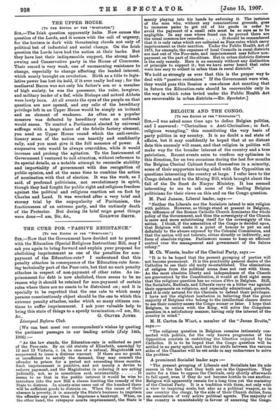THE CURE FOR "PASSIVE RESISTANCE."
[To TR. EDITOR Or TRIO ..ErscrATOR.”J Sr,—Now that the Government have decided not to proceed with the Education (Special Religious Instruction) Bill, may I ask you again to bring forward and explain your proposal for abolishing imprisonment as one of the penalties for non. payment of the Education-rater I understand that this penalty attaches in consequence of the Education-rate form- ing technically part of the Poor-rate, but that no such penalty attaches in respect of non-payment of other rates. As im- prisonment for debt is now abolished, there seems to be no reason why it should be retained for non-payment of certain rates where there are no assets to be diatrained on ; and it is specially to be regretted that the one rate to which many persons conscientiously object should be the one to which this extreme penalty attaches, under which so many citizens con- tinue to suffer imprisonment. I ask your valuable help to bring this state of things to a speedy termination.—I am, Sir, G. OLIVER JONES.
Liverpool Reform Club.
[We can best meet our correspondent's wishes by quoting the pertinent passages in our leading article (July 14th, 1906) :— "As the law stands, the Education-rate is collected as part of the Poor-rate. By an old statute of Elizabeth, amended by 12 and 13 Victoria, c. 14, in case of a refusal, Magistrateb are empowered to issue a distress warrant. If there are no goods, or insufficient to satisfy the demand, they may commit the offender to prison for a period not exceeding three months. Such imprisonment is punitive, and not merely a device to enforce payment, and the Magistrates in ordering it are acting
judicially, not, as is sometimes said, ministerially It seems to us that in the public interest it would be wise to introduce into the new Bill a clause limiting the remedy of the State to distress. In ninety-nine cases out of the hundred there will be sufficient goods to distrain on. When the cause of their absence is poverty, it is scarcely the State's business to imprison the offender any more than it imprisons a bankrupt. When, on the other band, the ratepayer courts imprisonment, the State is merely playing into his bands by enforcing it. The instance of the man who, without any conscientious grounds, goes to immense pains to get rid of his goods in order to avoid the payment of a small rate must be so rare as to be negligible. In any case where fraud can be proved there are the usual common law remedies It should be remembered that it is only rates which are collected as Poor-rates which carry imprisonment as their sanction. Under the Public Health Act of 1875, for example, the expenses of local Councils in rural districts are met out of the Poor-rate, and imprisonment may follow non- payment on the part of the citizen. But in urban districts distress is the only remedy. Here is an anomaly without any distinction of principle to support it; but we have never heard that rates were less easy to collect in urban than in rural districts."
We hold as strongly as ever that this is the proper way to deal with "passive resistance." If the Government were wise, they would pass this Session a oneelause Act enacting that in future the Education-rate should be recoverable only in the way in which rates levied under the Public Health Act are recoverable in urban districts.—ED. Spectator.]






































 Previous page
Previous page